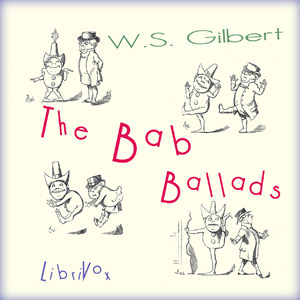The Bab Ballads are a collection of light verse by W. S. Gilbert, illustrated with his own comic drawings. Gilbert wrote the Ballads before he became famous for his comic opera librettos with Arthur Sullivan. In writing the Bab Ballads, Gilbert developed his unique "topsy-turvy" style, where the humour was derived by setting up a ridiculous premise and working out its logical consequences, however absurd. The Ballads also reveal Gilbert's cynical and satirical approach to humour. They became famous on their own, as well as being a source for plot elements, characters and songs that Gilbert would recycle in the Gilbert and Sullivan operas. The Bab Ballads take their name from Gilbert's childhood nickname, and he later began to sign his illustrations "Bab". (summary from wikipedia)
e-text with illustrations
44 episodes
Yvain, the Knight of the Lion is a romance by Chrétien de Troyes. It was probably written in the 1170s simultaneously with Lancelot, the Knight of the Cart, and includes several references to the action in that poem. In the poem, Yvain seeks to avenge his cousin Calogrenant who had been defeated by an otherworldly knight beside a magical storm-making fountain in the forest of Broceliande. (Summary from Wikipedia)
9 episodes
LibriVox volunteers bring you 10 recordings of Up The Line by Will Carleton. This was the Fortnightly Poetry project for February 7th, 2010.
10 episodes
LibriVox volunteers bring you 18 recordings of Ballad of the Tempest by James T. Fields. This was the Fortnightly Poetry project for July 4th, 2010.
18 episodes
The Ballad of the White Horse is a poem by G K Chesterton about the idealized exploits of the Saxon King Alfred the Great, published in 1911. Written in ballad form, the work is usually considered an epic poem. The poem narrates how Alfred was able to defeat the invading Danes at the Battle of Ethandun under the auspices of God working through the agency of the Virgin Mary. In addition to being a narration of Alfred's militaristic and political accomplishments, it is also considered a Catholic allegory. Chesterton incorporates a significant amount of philosophy into the basic structure of the story. (Introduction by Wikipedia)
9 episodes
The Hunting of the Snark - "An Agony in 8 Fits" is typically categorized as a nonsense poem written by Lewis Carroll, the pen name of Charles Lutwidge Dodgson. Written from 1874 to 1876, the poem borrows the setting, some creatures, and eight portmanteau words from Carroll's earlier poem "Jabberwocky" in his children's novel Through the Looking Glass. Carroll often denied knowing the meaning behind the poem; however, in an 1896 reply to one letter, he agreed with one interpretation of the poem as an allegory for the search for happiness. Scholars have found various meanings in the poem, among them existential angst, an allegory for tuberculosis, and a mockery of the Tichborne case. I just found it to be great fun to read. (Phil Chenevert)
1 episodes
Świat Ballad i Romansów, choć jak najbardziej rzeczywisty, o określonym miejscu na mapie i w dziejach, tchnie ludową wyobraźnią, niepokojącą, tajemniczą i groźną cudownością. W świecie tym niezywkłe siły i istoty, jak rusałki, zmory lub diabły, maniestują swą obecność w codzienności ludzi.Wydane w Wilnie w roku 1822 Ballady i Romanse to pierwsze dzieło polskiego romantyzmu. To zbiór niezwykłych, wzruszających, nieraz mrocznych lub smutnych, a niekiedy komicznych i dowcipnych historii. (Summary by Farelka)
15 episodes
Marmion is an epic poem in six cantos, written in emulation of the ancient Scottish minstrel style which was of such great interest to Scott. Unlike its predecessor, The Lay of the Last Minstrel, this one contains "introductions" to each canto, in the guise of poetic letters which serve the purpose of linking the ancient historical setting with Scott's contemporaneous society - a device which attracted some criticism.The story of Lord Marmion and his arch-enemy Harold de Wilton is told with Scott's familiar swirling dark flair, combining a complex tale of intrigue, inconstancy and deception with the historical details of the Battle of Flodden Field, in which the English forces routed those of Scotland, killing the Scottish king. - Summary by Peter Tucker
13 episodes
John Avery Lomax is a towering figure in the field of early American musicology and folklore. Through intensive field work, Lomax built up the core body of work for the Library of Congress Archive. "Cowboy Songs and Other Frontier Ballads" is his collection that propelled him to the forefront of his field and ignited new interest in American folklore, inspiring many to continue research. For his contributions to the field of cowboy music, Locas was inducted into the Western Music Hall of Fame in 2010. Many of the verses here are accompanied by musical scores, and some may be more familiar in their musical form such as "A Home on the Range." A wide array of characters and life across the western United States is represented here. - Summary by Larry Wilson
156 episodes
This is a collection of ballads, edited, with an introduction and notes by Andrew Lang. The ballads range widely in style, from the historic to the romantic, from the short to the epic, from Scotland to France. Some of the material is the fabric of well-known fairy-tales, others have a historical core, and again others are myths. In any case, every reader and listener should be able to find a poem in this collection that matches their particular style or mood. - Summary by Carolin
56 episodes
Verses, Popular and Humorous (1900) was the second collection of poems by Australian poet Henry Lawson. It features some of the poet's earlier major works, including "The Lights of Cobb and Co", "Saint Peter" and "The Grog-An'-Grumble-Steeplechase". Most of the poems in the volume had been written after the publication of In the Days When the World was Wide and Other Verses in 1896.
The original collection includes 66 poems by the author that are reprinted from various sources. Later publications split the collection into two separate volumes: Popular Verses and Humorous Verses, though the contents differed from the original list. - Summary by Wikipedia
Initial DPL: Larry Wilson and MC: Phil Chenevert
67 episodes

LibriVox volunteers bring you recordings of Double Sestina - Ye Goatherd Gods by Phillip Sidney.
This was the Fortnightly Poetry project for May 5, 2019. ------
Poem is included in the book "Countesse of Pembroke's Arcadia" Ye Goatherd Gods" depicts the sorrows of two shepherds who love the same woman. She has left them both, however, and the two shepherds are dejected and heartbroken. They appeal to the gods, to nature, and to the heavens in their angst, and everything they see is altered because of their sorrows. The poem is hyperbolic and highly emotional, with the two speakers engaged in a traditional pastoral singing match.
Alternatively its stanzas are the lamentations of two broken hearted goatherds who pine after the goddess Urania, who was one of the nine Greek Muses, the muse of astronomy and Astrology.
A sestina is a fixed verse form consisting of six stanzas of six lines each, normally followed by a three-line envoi. The words that end each line of the first stanza are used as line endings in each of the following stanzas, rotated in a set pattern with all six words appearing in the closing three-line envoi. The six key words in this poem are:
mountaines;
vallies;
forrests;
musique;
morning;
evening.
This is a DOUBLE sestina with 12 stanzas instead of 6. ( Summary by William Jones )
4 episodes
Mein blaues Buch ist eine Sammlung von Balladen und Romanzen, welche 1909 erschien. Löns war leidenschaftlicher Jäger und gerne in der Natur unterwegs. Viele seiner Beobachtungen und Eindrücke setzte er nicht nur in Prosa, sondern auch in Gedichten um. Er gilt als einer der Vorreiter für den Naturschutz und war schon zu Lebzeiten ein Mythos. - Summary by lorda
48 episodes












